Locked Down in Sri Lanka – By A Fernando
“Many of the things we desire are expensive. The truth is that the things that really satisfy us are totally free”
Having spent nearly two months in Sri Lanka, just missing mandatory quarantine by a few days, our time in Sri Lanka was an experience we would never forget.
I remember wondering whether we were crazy to leave the safety of Australia at this time. Irrespective of the situation in Sri Lanka, we have always travelled extensively in the island. Pre and post terrorist war, tsunami, SARS, Chi gunya and Easter bombings, somehow, we happened to be in Sri Lanka. This time was no different. With the belief “one lifetime is not enough to see what Sri Lanka has to offer” with almost 15 percent of the island made up of national parks and reserves, and world heritage sites, there is never a shortage of places to visit. Our biannual visits to Sri Lanka gave us the opportunity of spending time in the island, visiting far off places of historical, spiritual and cultural significance.
As we stepped out of the plane it was clear that the island had undertaken preparation measures for Covid-19, far more than we saw in Australia.
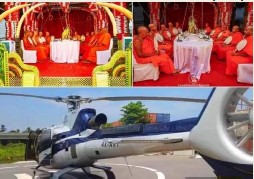
The presence of the air force personal amongst the airport officials checking passports with masked faces, the health care personnel in full body suits checking us as we came in a queue, with their impressive efficiency, gave us a sense of safety which I must admit we didn’t expect. It was apparent they were screening passengers for any symptoms, and separating the passengers from China and Italy from the rest.
Out of the airport it was business as usual in the airport pick /drop zone… Bustling with vehicles, with one difference… Everyone wearing masks! During
“Kassippu” makers where in full swing and so were the additional number of police ready to raid these backyard stills. With the knowledge “No better time to raid than during a curfew” police made a record number of arrests of makers and distributors of alcohol and drugs. Armed with Sri Lankan ingenuity, the distributors found novel ways to transport their goods, only to be caught by the police and shown in the news on the same day! Large drug hauls were bought in on a daily basis.
Televised addresses by both the prime minister and President at various stages, assuring the citizens of adequate stocks of basic necessities such as medicine, food and fuel, gave hope to those who felt hopeless. Above all, generating a feeling of hope and faith, that we as a nation will win this battle against the pandemic. Citizens deeply saddened and worried seeing news reports of the daily body count from around the world took solace in these messages, in spite of their political affiliations.
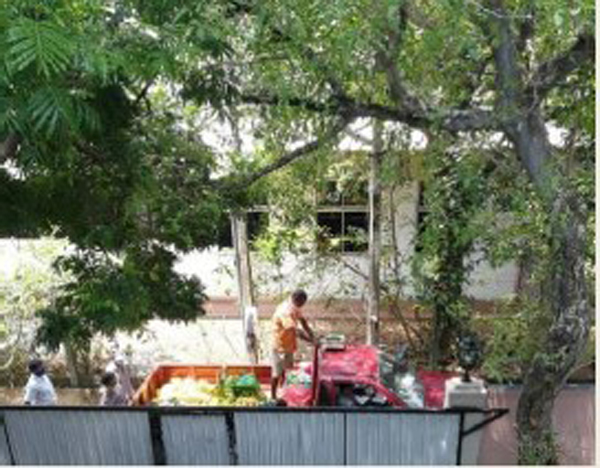
Police feeding the homeless, acts of kindness by a multitude of people from all walks of life were on the news. Street dogs and cats who roamed the streets in search of food were fed by the police and animal lovers.
For the first time, travelling to Sri Lanka took on a whole new meaning. House bound and with very little to do, came a whole new way of perceiving daily life.
A most enjoyable aspect was the silence. Hardly a vehicle could be heard. As a result, the bird sounds seemed louder than usual. As it was April, the mangoes and Jack fruit trees were full of fruit, the squirrels ran back and forth. They managed to get to the very top of the trees and eat the waraka and mangoes that we couldn’t get to. The coconut
necessary, we managed to create a fairly good vegetable patch. Even managing to eat homegrown kangkung, gotukola and mukunuanna before our departure.
I found myself teaching my friends gardening tricks. Growing up and living in Australia for 45 years, the home garden has always been a source of fresh vegetables. Though we had the option of ordering online from supermarkets, we chose to buy from the vendors that arrived at the gate. In addition to the novelty, we felt they needed the income more than the large supermarkets. As a result, we had fresh and unprocessed food.
Rising early in the morning with nowhere to go, sitting on our balcony, listening to the distant sound of pirith chanting; we waited for the mung beans, kadala, kos or bathala to boil. Scraping coconut and making katta sambol for breakfast became a daily occurrence. Hardly spending any quality time at home on our trips to Sri Lanka, opting to spend time with friends in beautiful places, hotels, through the years, we had never really enjoyed our home.
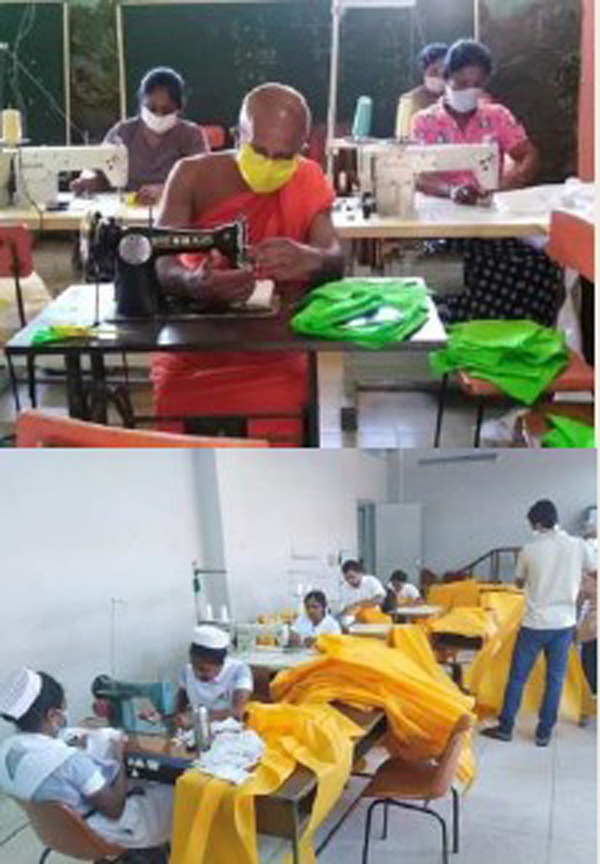
Despite the challenging conditions, as of May 1st to-date (21st) there have been no cases of community transmission of the virus in Sri Lanka. The conducting of contact tracing by intelligence services of the armed forces and the Police, together with health authorities desperately working around the clock, to curtail the spread, appear to have been effective. New cases are reported only among the quarantined, including members of the navy and those in quarantine returning from overseas.
Sri Lanka as a relatively poor island nation is now ranked 9th best country in the world for its successful immediate response on tackling the the 45-minute drive home, the driver was full of news about the Corona virus.
Arriving on the 11th of March, in time for the Battle of the Blues annual cricket match, it was as though nothing had changed in our social timetable, other than the looming talk of “the virus”.
Usual camaraderie and humorous banter continued, after the cricket match and the talk of an infected individual in one of the Thomian tents on the evening news, sent shock waves, through the normally comical cheerful friends. Sudden realisation that we could all be infected, was the start of our self-isolation, coupled with the curfew which continued to the day of our departure.
Despite the prevailing uncertainties, the state funded health service response to the challenges of Covid-19 pandemic was very impressive to say the least. No time during our stay did we feel unsafe, in fact it was quite the opposite.
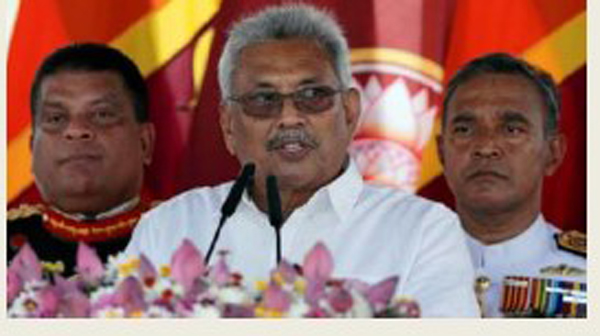
There was an overwhelming amount of media coverage: daily corona updates, continuous advice on hand washing and distancing practice, commercials advertising sanitising lotions, germ killing soaps and above all the number of panel discussions, covering subjects ranging from spirituality during the disaster, to indigenous medicine. Doctors and various government officials with impressive qualifications holding conversations and debates, on television programs and radio to inform the public about the pandemic.
People caught violating curfew was a daily occurrence on the news. With no access to buying alcohol due to the curfew, the local illicit alcohol plucker must have been considered an essential service, because one morning there he was at the gate. Delighted, we found out he was allowed to visit properties as people needed to use whatever food they had on the land as sustenance. Picking all the fruit we distributed it among the grateful neighbours. So, our coffers were full of kos, mangoes, waraka, coconut and thambili.
Sourcing food was the next hurdle. Nevertheless, a day into the curfew, we heard the “Malu, Malu!” early in the morning. Being vegetarians, that was out for us. However, we enjoyed the birds eye view of the people coming on to the road in masks, waiting to be served. The chaps in masks and gloves yelling “Malu! Malu!” and selling fish was a novel sight.Then came the “Elolu! Palathuru!”… followed by “Pol! Pol! Pol!”, “Biththara, Pol Thel!” from the various street vendors selling a variety of vegetables and fruits.
As time went on, we were fully stocked and shared fancy recipes, like my Kos chips with chilli and salt as well as Kos chips in sugar syrup. Some friends and neighbours had let their domestic staff leave for their homes. Having to fend for themselves, they soon learnt that life was not that bad after all.

I followed up on an interesting news item, which basically stated that anyone wishing to grow their own vegetables will be supplied with seeds. Calling the number given, I was directed to the number of the “Grama Niladari” for our area. Less than two hours later, to our delight, there was a man on a motorbike with 28 envelopes with seeds, and the house numbers of the area. Each household was given an envelope with 5 varieties of seeds; chilli, bandakka, batu, pathola, and karawilla, along with instructions. Coconut shells were used to grow the seedlings. With little to do, and an affinity for gardening, improvising where virus. It is noteworthy that Sri Lanka’s success can be attributed to their geographical position as an island, their immediate response and the hard work of the Army, Navy, Airforce and Police along with the healthcare personnel, the cleaners, spiritual leaders and the involvement of media to send out a positive message and above all the people who made a supreme effort to do as they were instructed. The indigenous practice of drinking kotthamalli, tea and ginger infusions and good hygiene practices would have helped too.
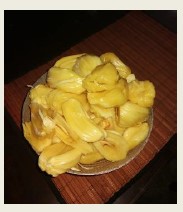
With the UN’s World Food Programme (WFP) predicting, a famine of “biblical proportion”, 256 million people on the planet on the brink of starvation by the end of this year, I thank God for the rain, sunshine, and the hard working farmers of Sri Lanka for the fresh food we enjoyed during our stay. With a tough road ahead, and the risk of recurrence, people sit in daily prayer invoking blessings over the island.
Initial reports suggested international travel may not resume until the end of 2020. Nearing two months on the island, it became apparent that we may have to stay in Sri Lanka longer than expected. In the early hours, on the 9th of May, we were on a charter flight bound for Melbourne, Australia, ending a 52-day lockdown life style. A flight to repatriate Sri Lankan students from Australia was our ride home.
Currently sitting in a hotel room in quarantine, looking out the window, putting pen to paper, praying that this will all come to pass with no more loss of life. We are Appreciative and grateful for everything from a coconut shell in Sri Lanka to the 15-minute fresh air and exercise break that we are given once a week during our quarantine period in Australia.
A Fernando








No Comments